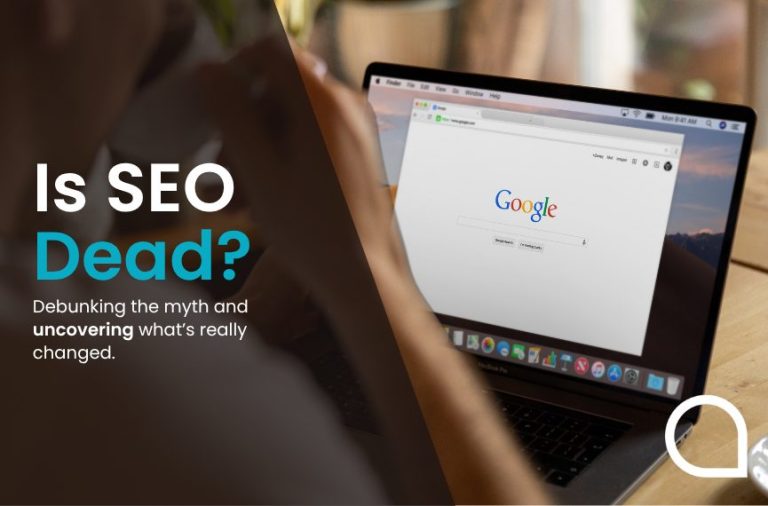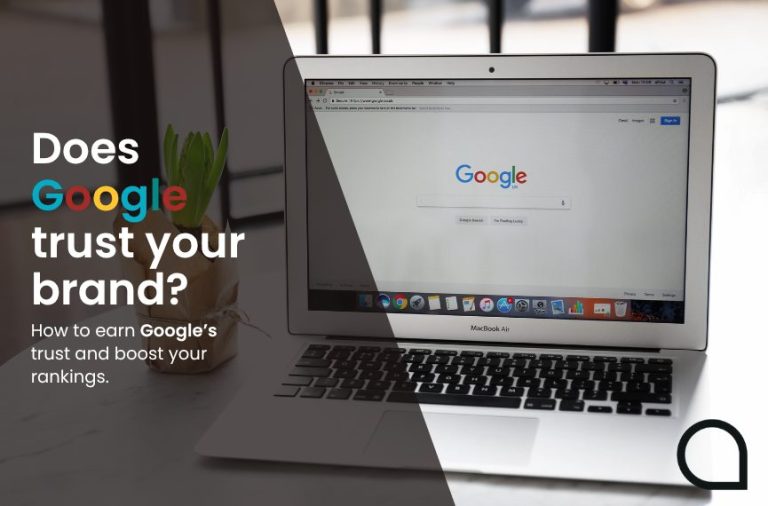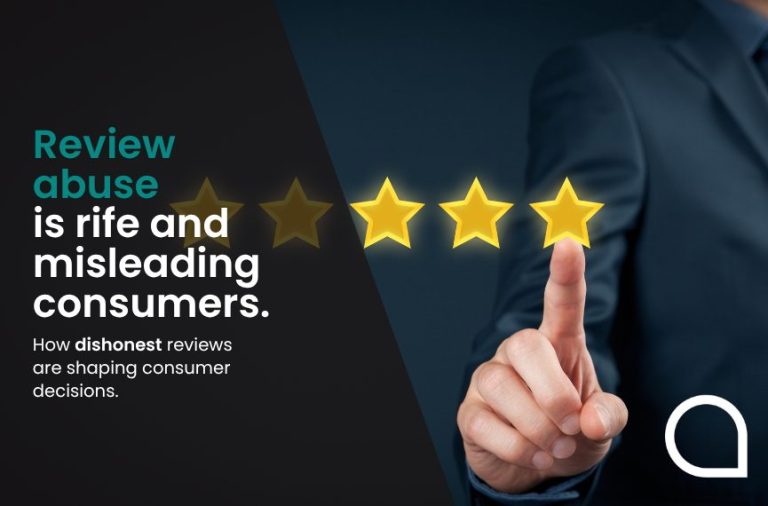
What are the penalties for AI misuse?
Embracing Artificial Intelligence (AI) whether for personal or professional use has clear advantages – and Google agrees. While it’s a common misconception that Google automatically
In January of this year, I wrote about online reputation management and how hard it was becoming for firms to address the need for them to manage this. Driven, in part, by large internet brands stoking an obsession with public feedback, it has inadvertently created a fertile ground in which bad actors can thrive.
In my earlier article I wrote:
The problem with this is that it lays bare the current fixation the larger real estate owners such as Google, Amazon and Facebook, have with reviews.
They argue, quite compellingly, that you can’t disagree with the ‘voice of the crowd’. If a lot of people are leaving bad reviews for you, your service or products must be poor. QED.
Logically, this makes sense. If you’re getting lots of poor reviews you probably need to do something about your product or service levels.
But their confidence in this system and their belief that this process is fair is predicated on two assumptions.
First, they assume that all reviews are genuine. Second, they assume that all reviews are equal.
And they are wrong in both cases.
The current obsession with reviews is driving, and rewarding, entirely the wrong behaviours. It puts power into the hands of consumers, power to hold businesses publicly to account irrespective of how they choose to exercise that power. The problem arises, however, when their aim is not to help businesses improve their performance. What can a business do if the objective is far more sinister than that?
This becomes even more dangerous because reviews are becoming essential if you want to rank in the search results. If you search Google for whether customer reviews help SEO, the top search result is an American company, 1SEO, who say “online customer reviews send a strong signal to search engines that communicates expertise, authority, and trust”. We know that Google’s recent updates have been focused on Expertise, Authority and Trust and that these factors are becoming essential to rank websites in search, particularly e-commerce, which further reinforces the desire to get more reviews.
Google use reviews as part of the algorithm for deciding who goes where in SERPS, especially in the local results. In fact, there is a very strong correlation which has been identified in research, that reviews are a ranking factor in local search results and that is where the majority of small businesses get their sales leads from.
But are reviews always fair? In an interesting article on Local reviews and Ratings, Moz states in their summary “No ethical, dedicated business owner needs to feel dread of user reviews.”
The answer lies in the power of numbers.
In the early days of my Marketing career I was taught that 1063 was the minimum sample size to get a meaningful result in any research, but today ask Google the Question “sample size to be statistically significant” and the answer comes back 100. Whether you pick the larger or smaller figure, no one seems to suggest that a number smaller than 100 is statically significant. Bigger brands can easily fly past this number of reviews and once there are more than 100 reviews about them and their products available online, you should be able to form a picture of what they are like as a business. But where does this leave small businesses? In truth, they are up a creek without a paddle. They absolutely need to take notice of reviews but have neither the time nor inclination to do so. Business owners, hard pressed for time already, have better things to do than spend time every day searching online for what people have said about them.
Google’s original patent is, in part, at fault. The original idea was rather then just look at the content on a page, look at the number and quality of backlinks to a page to determine its value in any search query. At scale, this ‘voice of the crowd’ was effectively using a link as a vote, with the most votes getting the coveted number one slot (caveat – this is a very oversimplified assessment of the search algorithm, made to illustrate a point). In short, the more votes, the more reliable the result.
The concept of ‘online reviews’ as a relevant tool for measurement seemingly started with Amazon in 1995, but it took almost 20 years to gain its current importance, when both Facebook in 2007 and Google in 2005 introduced their own review mechanisms. And as these three digital behemoths continued to grow, so did the importance of reviews.
By 2012, business were actively beginning to use reviews as a tactic to improve their online presence and larger brands made a point of promoting them. The value for them was that at scale it provided a valuable feedback loop, identified firms that are performing badly (or well) and provided reassurance for consumers. According to research in United States, 70% of shoppers read reviews before purchase, so seeing reviews are essential.
A fascinating October 2020 report from the UK Department for Business, Energy & Industrial Strategy (DBEIS) states:
There were 6.0 million private sector businesses in the UK at the start of 2020.
This consisted of:
That’s 99% under 49 employees.
Look at number of firms by turnover band and you can see that the majority of these businesses, around two million of them, turnover under £250,000 a year
In addition, most of these firms have one or two full time employees, meaning they truly are the backbone of Britain and are small, often home or small office based enterprises, who are trying their best to make a living.
Look at local search for any type of industry and the majority of businesses set no store by reviews; many don’t have a single review. They don’t want to be involved in soliciting public feedback from their customers, primarily because they are too busy trying to run their business and do a good job. But let’s say for example that they have acquired, organically, six reviews over the past five years, all at 5 star. Their star rating and average star rating is of course 5 out of 5. Then they get a one star review and immediately their percentage drops to 4.4. When people read these reviews (we know from the research that they do) then they will be immediately drawn to the negative review. It’s the same as the nightly news at 10pm; they inevitably focus on bad news stories rather than good, leading the public to expect that bad news is the thing they should be looking out for.
If the feedback is genuine, well intentioned and above all, balanced, then it’s fine, but the internet is not like that. Awash with individuals operating under pseudonyms, you only need to look at Twitter to see how foul and abusive people can become. Emboldened by getting away with behaving badly in online social media platforms, they have now extended into the reviews space and the results for small business can be devastating.
We’ve seen examples over the past two years of businesses we know and work with, literally being held to ransom by bad reviews. Disgruntled former customers take to Google or Facebook and leave a damning review, often under a pseudonym and then demand that the business refund money, provide goods or services or just work for free. The sting in the tail though is that even if they do remove the harsh words and one star rating (and this isn’t always the case), some have taken to leaving 3 star reviews with no comment, thereby damning them with faint praise.
The reality is that when people do this, there is absolutely nothing a business can do. Both Google and Facebook refuse to engage directly with businesses about reviews that have been left and if you want to challenge one, there is a simple form to complete on both platforms, with a limited number of proscribed categories and a caveat that there is no guarantee that they will remove it.
In short, unless the writer of the review threatens violence or has broken the law, there’s little you can do to get it removed.
Trolls know this. They know that by leaving a review that’s says the business is shoddy, that they don’t care about customers, that they are involved in a culture of malpractice and generally abuse customers, along with a one star review, that typically it will stick. Businesses know that when this happens, there’s nothing they can do to remove it.
The logic of allowing public reviews of your business, product or service is that you are being transparent and encouraging feedback that will either show you to be the wonderful business you are, or that you need to improve, and you can make the improvement publicly. The reality is that what started out as a process for helping businesses improve their products, services and customer care has turned into a vicious battleground where anonymous keyboard warriors have the upper hand. Small numbers of reviews can have a disproportionate impact but with no control over who can leave a review and hard words, even if they are unfair, can stick.
This needs to stop. The majority of businesses in the UK have neither the time nor the inclination to be addressing this kind of online behaviour. Whilst supporters of the system will point to review management systems, processes, protocols and software to handle it all, even outsourcing it if necessary, why should small business owners be forced to go down this route? Why should they be forced to take part in, and pay for a system that they neither wanted nor needed? Remember, the majority of businesses in the UK will never get more than ten reviews and as such, the harm reviews can do more than outweighs the good for them.
If this were a piece of software and we had identified a vulnerability for attack which allowed bad actors to exploit the system, a patch would have been released by now. That this remains unchanged tells you everything you need to know about the power of the large tech giants and their indifference to the plight of hard working SME’s in this country.

Embracing Artificial Intelligence (AI) whether for personal or professional use has clear advantages – and Google agrees. While it’s a common misconception that Google automatically

Whether it’s Google’s AI (artificial intelligence) Overviews or AI-powered SEO (search engine optimisation) tools, this emerging and fast-developing technology has fundamentally altered the SEO landscape.

The widespread creation and adoption of AI (artificial intelligence) tools has undoubtedly changed the way that search engine optimisation (SEO) services for websites are performed.

While Google enjoys the biggest share of the search engine market (around 90%, according to StatCounter), the second-largest search engine, Bing, shouldn’t be overlooked. Following Bing’s

Trust: online searchers are ready to give it, and businesses want to earn it as quickly as possible, but how can you accurately assess the

I wrote recently about the ridiculous situation of being asked to leave a review for a parking space, but what I encountered yesterday is, I